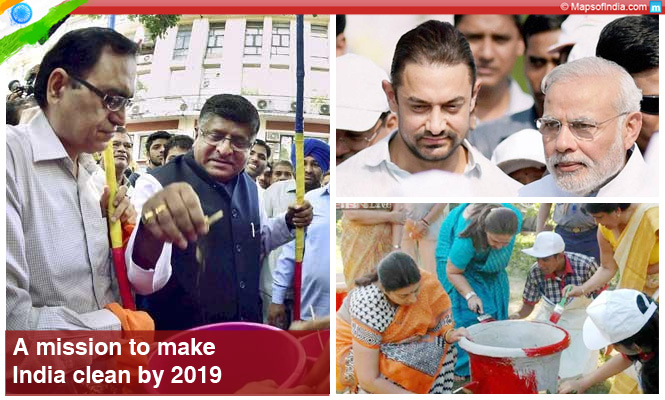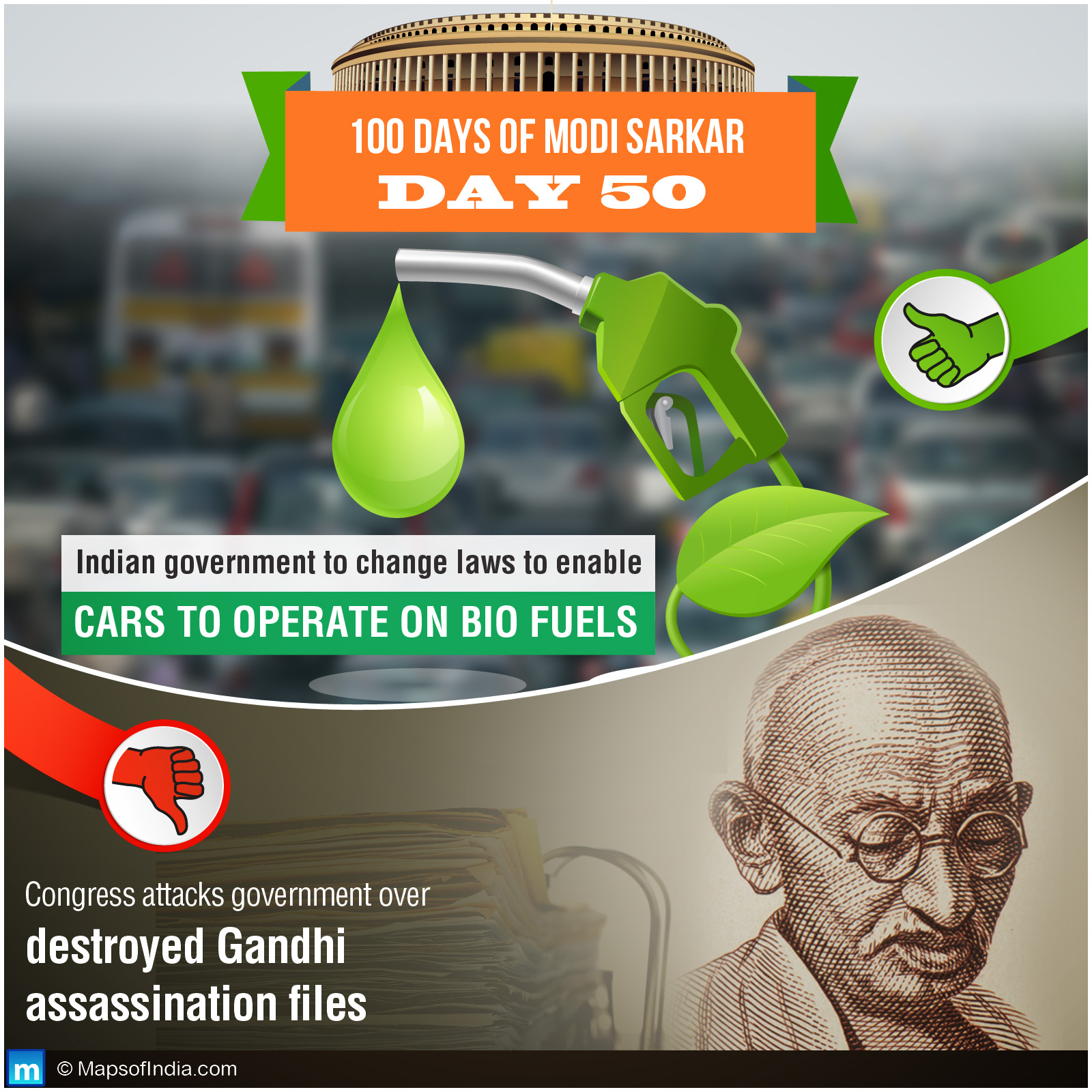It seems that India is waking up. Modi’s government is touching all those chords of life which were important but had not been touched or ignored for so long. Amidst of all political developments, Government launched a noble and much needed campaign “Swachh Bharat” on October 2nd 2014 on the birth anniversary of Mahatma Gandhi. This is an initiative to make India absolutely clean by 2019. Year 2019 will mark the 150th birth anniversary of Mahatma Gandhi and clean India will be the best tribute that can be paid to ‘Bapu’ who never compromised on cleanliness. Prime Minister Narendra Modi urged every Indian to devote 100 hours a year towards cleanliness.
Indians pay a lot of attention to personal hygiene but carry an altogether different attitude when comes to cleanliness of their surroundings, public places, offices, parks, roads, streets and so on. Many of us do not hesitate to litter on roads. Garbage is generally thrown outside the dustbin than inside. Indians still pee and defecate in open. Survey reports point out that half of the households in India do not have access to toilets.
All corners of India under the ambit of the Mission
Under Swachh Bharat campaign government will spend near about Rs. 11 crore to construct 11 lakh toilets in India. Every gram panchayat, panchayat samiti and Zila Parishad in the country will be involved in the initiative for its success.
Many big corporates are becoming part of the campaign. Bharti and TCS have announced their plans to provide financial help for the success of the campaign. It is expected that World Bank will also contribute.
Measures announced
Swachh Bharat campaign will work towards the elimination of open defecation, municipal solid waste management, radication of manual scavenging, behavioral changes in people and will pursue Indians to follow healthy sanitation practices. Few points
-
Under Swachh Bharat Abhiyan Rs. 20 lakh will be provided to each village for the next five years.
-
Rs. 1,34,000 crore has been allocated to construct 11.11 crore toilets in 5 years.
-
Rs. 62,009 crore has been allocated to urban areas for 20 million toilets by 2015.
-
1.04 crore households to have toilets by 2019.
-
4,041 towns will get municipal solid waste management by 2019
-
Elimination of open defecation by 2022
Swachh Bharat Mission Challenges
Swachh Bharat Mission looks an ambitious project where the focus is towards building toilets. To make it a mass movement PM Modi has involved many celebrities Salman Khan and Priyanka Chopra as a brand ambassadors for the cause. The government has also contacted yoga guru Baba Ramdev, Art of Living guru Sri Sri Ravi Shankar, the Ramakrishna Mission and the Kanchi Kamakoti Peeth and government is still in the process of pursuing the Catholic Bishops Conference of India and Muslim clerics to become the part of the campaign.
1. The biggest hurdle will be to sustain the Swachh Bharat Mission for a longer period of time. Many such campaigns have been initiated in the past but met the ill fate.
Central Rural Sanitation Programme (CRSP) was launched in 1986 to improve the quality of life of rural people and to provide dignity to rural women. Under this scheme Ministry of Rural Development undertook total sanitation with a set target to provide complete sanitation by 2012. To promote sanitation in rural areas ‘Total Sanitation Campaign’ (TSC) under CRSP was launched in 1999. It was a community-led and people-oriented programme. Budget was allocated, plan layout was made but the targets were never met.
Nirmal Bharat Abhiyan was launched by UPA government in 2012 with an objective to eliminate problem of open defecation. Total Sanitation Campaign in 1999 was revamped to Nirmal Bharat Abhiyan in which guidelines were modified and new strategies were made. But again, the Abhiyan was not a success.
The union cabinet has now approved to restructure “Nirmal Bharat Abhiyan” into “Swachh Bharat Mission”. The programme will be implemented by the drinking water and sanitation ministry in rural areas whereas the urban development ministry will do it in urban areas. The mission thus have two sub-divisions – ‘Swachh Bharat Mission’ (rural) and ‘Swachh Bharat Mission’ (urban).
2. Next biggest challenge is to change the mind set of millions of people. How will government break that mind set and infuse a brand new thinking is a difficult task to accomplish?
3. Government has to tackle the problems of Safai karamcharis so that they can play an active role in the campaign. Their long pending demands of pension, regularization of work, promotion along with many others must be met.
Conclusion
India needs a change and such cleanliness drive needs building trust with everyone. Earlier we talked, talked and just talked. But now is the time to act.
India is ready for such a mass movement and moreover the project is imperative as 67.3% of rural households have no access to toilets. 10% of schools in India have no toilet facilities for female students.
Clean India will not only make our surroundings better but it will also cut down the healthcare cost and boost tourism in India.
For the success of this campaign every Indian will have to come forward and contribute.
I have taken a pledge to keep my country clean, have you?
Read more :
MUDRA Bank : Details, objectives and benefits
Swachh Bharat Abhiyan: Making India Clean & More
Swachh Bharat Abhiyan: Bal Swachhata Abhiyan
Swachh Bharat Abhiyan: Modi Launches Cleanliness Campaign
Swachh Bharat Abhiyan: Cleanathon Campaign by NDTV India, Dettol
Swachh Bharat Abhiyan: Success Stories of a Few Villages
Swachh Bharat Abhiyan: The Celebrity Chain for Cleanliness Continues
Swachh Bharat Abhiyan in Full Swing in States
Swachhta Entrepreneurs – An Operative Wing for Swachh Bharat Abhiyan
Swachh Bharat Abhiyan: A Stage-managed Cleanliness Operation in Delhi?
Swachh Bharat Abhiyan: Celebrities and Politicians Join Hands
Swachh Bharat Abhiyan: India Observes World Toilet Day
Clean India Campaign – Some Lessons from Other Countries
Swachh Bharat: You and Your Dog, Who Will Scoop the Poop?
Swachh Bharat Abhiyan: Will It Help Reduce the Incidence of Communicable Diseases?
Swachh Bharat Abhiyan: Then Why Do We Pay for 50,000 Sweepers in a City?
Swachh Bharat Abhiyan: Can We Follow a Green Diwali This Year?






